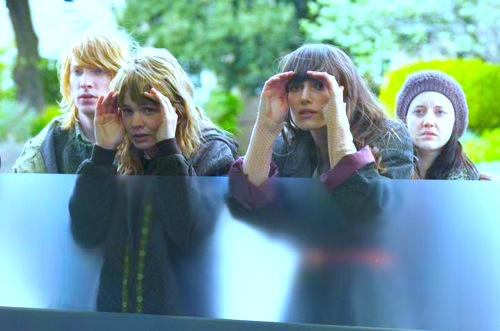By Jason Apuzzo. I’m not sure we’re going to have time today to review director Mark Romanek’s new adaptation of Kazuo Ishiguro’s dystopian novel Never Let Me Go – which recently debuted in Toronto and opens in limited release nationwide today, starring Carey Mulligan, Keira Knightley and Andrew Garfield (the new Spider-Man) – so I thought I’d post an excerpt from Andrew O’Hehir’s interesting review over at Salon.
You could describe “Never Let Me Go” as set in an alternate-history version of postwar Britain, but as with all really good alternate histories, the changed universe really isn’t the point. Director Mark Romanek captures the slightly seedy and rundown reality of ’70s and ’80s British life in astonishing and even tragic detail; this is more like a period piece than a science-fiction movie. In fact, it resembles a Merchant-Ivory tragedy about doomed love in a war zone, except that the doomed love involves human guinea pigs and the war zone is not some tropic zone but the alleged good intentions of medical science.

There’s no way to write about “Never Let Me Go” without at least dropping hints about the ultimate destiny of Kathy (Carey Mulligan), Tommy (Andrew Garfield) and Ruth (Keira Knightley), the romantic triangle who meet as children in a dreary, peculiar boarding school called Hailsham House. If you don’t want to know any more about that, stop reading now. This is really never a secret in the film, although it’s concealed at first under a mask of horrifying euphemism — as an adult, Kathy becomes a “carer,” who works with “donors” until they reach “completion” — and I had read Ishiguro’s unforgettable novel and knew what was coming. Still, there’s a scene about 20 minutes into the movie when a sympathetic teacher named Miss Lucy (Sally Hawkins) finally spells out what the Hailsham children need to know about their future if they’re to have “decent lives,” as she puts it, and Romanek dramatizes this hammer-blow, life-changing moment with such power that I don’t want to undermine it.
Screenwriter Alex Garland, who is himself a novelist, sticks close to both the letter and spirit of Ishiguro’s novel; this movie is a veritable clinic in precise literary adaptation. He incorporates snatches of dialogue and even voiceover (read by Mulligan) straight from the book, without swamping the human drama or overwhelming Romanek’s astonishing visual evocation of a bygone Britain. His innovations are limited, but they help set the stage in important ways: The big medical breakthrough came in 1952, we are told in an opening title, and by 1967 life expectancy exceeded 100 years. This came at a price, of course, and “Never Let Me Go” asks us to consider that price in all its dimensions. Continue reading Never Let Me Go: ‘Devastating, Dystopian’

